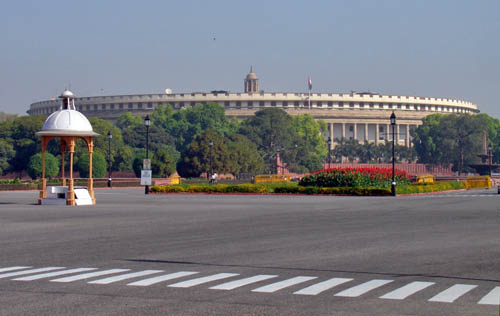By: Ravi Sinha
 Track2Realty Exclusive: Come budget and the real estate in the last few years seems to have been repeating the rhetoric of industry status. As a result, year after year it has been a case of realty proposes and the Finance Minister disposes. However, the sector on the eve of 2013-14 makes a strategic shift to be more realistic with its causes and concerns. As a result, there are more rational voices coming out of the respective real estate industry bodies and the individual developers. Infrastructure status, making housing a priority sector under Special Residential Zones (SRZs) and other tax sops are indicating that finally the policy advocacy for the sector is moving in the right direction.
Track2Realty Exclusive: Come budget and the real estate in the last few years seems to have been repeating the rhetoric of industry status. As a result, year after year it has been a case of realty proposes and the Finance Minister disposes. However, the sector on the eve of 2013-14 makes a strategic shift to be more realistic with its causes and concerns. As a result, there are more rational voices coming out of the respective real estate industry bodies and the individual developers. Infrastructure status, making housing a priority sector under Special Residential Zones (SRZs) and other tax sops are indicating that finally the policy advocacy for the sector is moving in the right direction.
After all, the sector has learnt its lessons on fire. Facts speak for themselves. Developers were cautious in launching projects as the gap between a launch and the absorption numbers reduced to 32,000 units in 2012, compared with 82,000 and 94,000 units in 2010 and 2011, respectively, according to a Knight Frank report. According to a Cushman and Wakefield report, there was a 16 per cent drop in the residential market across major cities in India in 2012.
Consultancy firm DTZ says it expects an extension of an interest subsidy scheme with enhanced limit on housing. “We hope the finance minister relaxes norms pertaining to external commercial borrowing (ECB) for low-cost housing. The government should look at development of special residential zones, says Anshul Jain, Chief Executive Officer of DTZ India.
In the run up to the upcoming Union Budget, the National Real Estate Development Council ( NAREDCO) has made a pitch for the sector to get infrastructure status and rental housing be made more attractive to address the shortage of houses. The industry body says the deduction from rental income under Section 24(a) of the Income Tax Act should be increased from 30 per cent to 50 per cent. This will promote rental housing. And, for women and senior citizens, the deduction could be 100 per cent, keeping social requirements and empowerment of women in view.
CREDAI has presented a wish list to the Finance Minister, which includes the demand for an inclusive housing policy and tax incentives. The tax incentives suggested by the body include allowing tax exemption for small houses of under 60 square metres of carpet area and creation of special housing zones with tax exemptions on the lines of SEZ for constructing 45 square metres houses for low income groups and 30 square metre houses for the economically weaker sections.
CREDAI National President Lalit Kumar Jain says affordable housing should be treated as priority sector and the rates of interest for housing loans should be brought down to an acceptable 7.5 per cent. Home loan should cover 90 per cent of total cost including taxes.
“Over the last nine months, the credit to commercial real estate has gone down by more than 13 per cent and priority lending to the housing sector by 1.29 per cent. The present risk weightage of 1.25 per cent given by the RBI, resulted in choking of bank finance to real estate, which in turn impacted the availability of housing stock and the prevailing market-driven high prices,” says Jain.
This policy advocacy seems to be heading in the right direction since Union Minister for Housing and Poverty Alleviation has also agreed that once affordable housing is a part of the infrastructure sector, four per cent of bank loans should be reserved as priority loans for affordable housing. Maken suggests like for infrastructure projects, a delay of more than six months should not be considered as non-performing assets.
Brotin Banerjee, Managing Director and Chief Executive Officer of Tata Housing expects a raise in the income-tax exemption limit to Rs 3 lakh and a reduction in excise duty rates to put higher disposable income at the hands of the public. His demand is that service tax be done away with in the housing sector to motivate consumers to increase the buying activity and revive demand.
The sector seems to have realised that benefits of industry status, that is easy access to finance, should be the larger objective, instead of getting into the rhetoric of industry status that has not gone down well with the government due to the inherent contradictions in the nature of the business of real estate. No wonder, the demands are more focused this time around and the sector understands that many of their causes and concerns will be automatically addressed if housing is declared as infrastructure.
However, some analysts point out the anomaly in the infrastructure demand as well. They believe currently companies building roads, pipelines and telecom towers can access financing from banks or non-banking finance companies at lower rates, and for a longer period. Infrastructure development has certain special needs – it is shared among a large number of people, and it is difficult to keep out free riders, making it hard to finance. Typically, the initial investment is considerable, and it only pays off after some time.
In addition, it permits lower costs to an entire gamut of local enterprises. Thus, it makes sense to have different standards and requirements for infrastructure. Does real estate development practically meet any of these criteria? Critics of infra demand are asking this even though the realty sector has practically climbed down to be heard by the Finance Minister.





